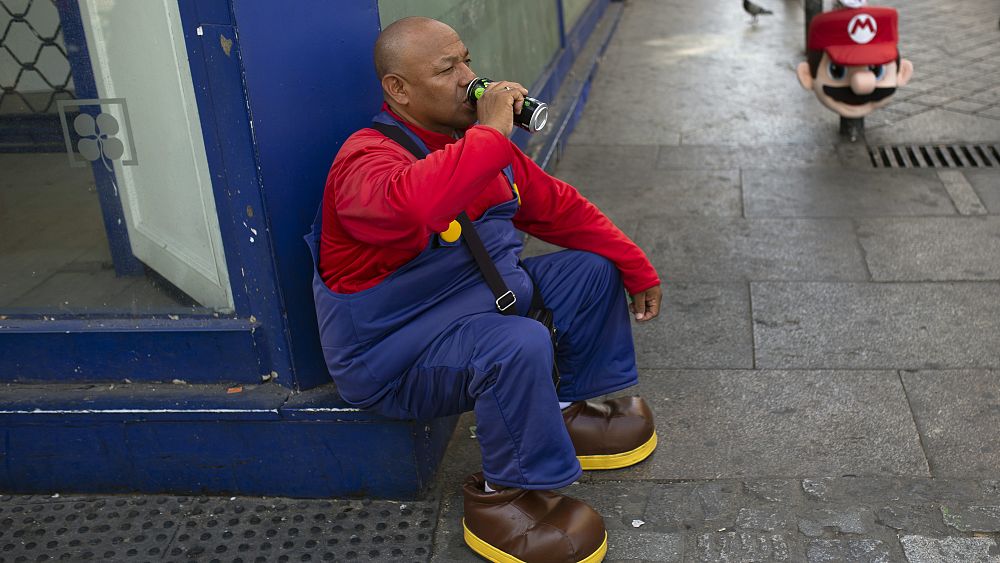
It seems legislation in European countries hasn’t quite caught up with just how hot summers are getting. Here’s what laws in the UK and EU say.
As the thermometer is expected to reach 45C in Spain this week and at least 10 cities in Italy have been put on high alert, the issue of when is it “too hot to work” has reemerged.
Last summer, as the UK faced its first-ever extreme heat warning, British workers’ union GMB called for a “too hot to work” law to be passed as soon as possible to protect labourers from being forced to work under scorching, dangerously unhealthy temperatures.
Their appeal raised the question: when is it too hot to work, and why don’t we have more rules about it?
Despite last year’s call to action by GMB, there is still no regulation in the UK defining how hot a workplace has to be before a worker can justifiably ask to be sent home (and douse themselves in an ice bath), though there is a recommended minimum.
Health and safety guidelines require the workplace to be “comfortable”, but only excessive cold is defined, stating temperatures shouldn’t fall below 16 degrees Celsius in an office environment, or 13 degrees if the work is physically demanding.
There’s no mention of an upper limit, which was probably not considered necessary a few decades ago, but which is now a burning issue.
Surprisingly, countries that are much more used to high temperatures are not much better prepared, despite the risk that the extreme heat poses to our wellbeing.
At the European Union level, there is no common rule defining the maximum temperature permitted in the workplace. But some countries have implemented their own.
France
In France, the “Code du Travail” – dictating the country’s labour laws – does not determine a maximum workplace temperature, but it does require employers to make sure their workers are able to do their job under safe conditions – which could arguably include protecting them from the risks posed by extreme heat.
Under an article of the code, employers in the construction sector must provide their workers with at least 3 litres of water a day – which could be considered a key relief during hot days.
Another provision allows workers to interrupt their jobs when they fear an immediate danger to their life – but whether this would include a heatwave is subject to interpretation and is not explicitly defined by the law.
Italy
Italy’s labour law doesn’t define a maximum temperature allowed in the workplace, but, similarly to France, it requires that employers make sure their workers are able to perform their job safely.
According to a 2015 decision of the country’s top court of appeal, workers have the right to interrupt their activity – without losing income or being fired – if their employer fails to guarantee safe working conditions or makes them work under “prohibitive” temperatures.
In the 2015 decision, the court was ruling in a case involving extremely cold temperatures – but there’s no reason why the same guideline shouldn’t be applied to extremely hot temperatures.
Germany
As temperatures soar in Germany, as across most of western Europe, Germans too have started to wonder what their rights are when it comes to being “Hitzefrei auf der Arbeit” – heat-free in the workplace – just like students are allowed to be off school because of the hot weather in summer.
Germany defines the maximum temperature that should be reached in the workplace as 26 degrees Celsius under normal circumstances, but this is not a limit enshrined in law. If temperatures exceed 26 degrees Celsius, employers must ensure that workers proceed with their activity safely, including providing drinkable water when the thermometer reaches 30 degrees Celsius, and allowing for breaks.
When a workplace reaches temperatures beyond 35 degrees Celsius, it is considered “unsuitable” for work unless further measures are taken. That doesn’t mean workers are allowed to go home: rather, employers should make sure to cool down the room.
Spain
More so than the other countries mentioned, Spain regulates the maximum workplace temperature quite clearly.
The country’s National Institute for Hygiene and Safety at Work states that a temperature between 17 and 27 degrees Celsius is required for work in an office, while work that requires light physical effort should be performed at a temperature between 14 to 25 degrees Celsius.
If an employer does not respect these requirements, workers can report them to a government body, the Inspección de Trabajo y Seguridad Social (literally, the Labour and Social Security Inspection) or a workers’ union to make sure they comply with the law.
So how protected are workers from the heat?
Unfortunately for workers, this kind of legal protection against heat in the workplace does not seem to have risen as quickly as the temperatures on this warming planet.
Granted, in all four of these countries, national guidelines require from employers a duty of care towards their staff, and some even allow for workers to interrupt their activity in the event of dangerously high temperatures. However, it’s unclear how often workers can successfully rebel against working in extremely hot conditions.
But workers’ unions are trying to get governments to recognise a maximum temperature above which work should not be permitted – as we are seeing in the UK and Italy – and we can expect the topic to become increasingly contentious as the planet gets warmer and heatwaves become more frequent
Now, fellow worker, it’s time for me to take an ice bath.